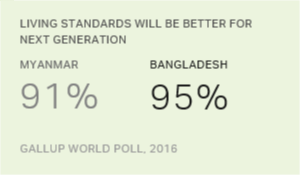Story Highlights
- 56% of Pakistanis are confident in the government, up from 26% in 2013
- 55% say they approve of their country's leadership, up from 18% in 2013
- Dismissal, indictment of Nawaz Sharif may risk gains
WASHINGTON, D.C. -- Former Pakistani Prime Minister Nawaz Sharif's ouster and subsequent indictment on corruption charges may damage Pakistanis' recently restored faith in their leadership during his tenure. Before Sharif's removal in July, the majority of Pakistanis approved of their country's leadership (55%) and expressed confidence in the national government (56%). This is a turnaround from the low levels recorded before Sharif took office in 2013.

Pakistanis' confidence in their government and approval of their leadership hovered at or near record lows prior to Sharif's election in June 2013. Confidence in the national government had bottomed out at 23% in 2012, in the wake of the "Memogate" scandal that indicated Pakistani civilian leaders had requested U.S. assistance to deal with the fallout after the death of Osama bin Laden. Fewer than one in five Pakistanis (18%) said they approved of their country's leadership in May 2013, just before Sharif's election.
After he took office, both measures improved markedly and kept improving. Pakistanis' approval of their country's leadership rose 32 percentage points between 2013 and 2014, while confidence in the national government increased 17 points. The 2017 figures for Pakistanis' confidence in the national government and approval of their country's leadership effectively tie the record highs at points in the past decade.

Access Global Survey Data
Shape your research on global issues with access to opinions from every corner of the Earth.
Sharif Has Remained Popular Despite Corruption Allegations
Sharif maintained relatively high approval ratings throughout his most recent tenure as prime minister, with about half of Pakistanis saying they approved of his handling of the job. In April 2016, Sharif and his family were implicated in corruption with the release of the "Panama Papers." According to these documents, Sharif's family owned a series of high-end properties in London, through shell companies -- and these properties were reportedly not included on Sharif's family's wealth statement.
In April 2017, the Pakistani Supreme Court ordered an investigation into these claims, which eventually resulted in Sharif's removal. Despite these allegations and the investigation into them, 51% of Pakistanis said earlier in 2017 that they approve of his handling of the position.

Bottom Line
No Pakistani prime minister has ever served a full term; most have been deposed by judicial decision or military coups. Sharif's dismissal continues this unenviable tradition and could weaken Pakistanis' confidence in their civilian government and their approval of the country's leadership.
Sharif was popular before his indictment, and apparently was planning a return to politics by resuming his position as the head of the Pakistan Muslim League-Nawaz (PML-N) Party. An ally of Sharif was named interim prime minister, and his brother was set to be his successor -- likely indicating his ouster would have little practical impact on the country. However, Sharif's indictment and the warrant issued for his arrest, following a failure to appear in court on Oct. 26, throws this apparent continuity into question. Another hearing in the case against Sharif is scheduled for Nov. 3. It is unclear whether the former prime minister will appear.
Survey Methods
These results are based on face-to-face interviews with approximately 1,600 adults, aged 15 and older, conducted in Pakistan March 20-May 3, 2017. For results based on the total sample of national adults, the margin of sampling error is ±2.9 percentage points at the 95% confidence level. All reported margins of sampling error include computed design effects for weighting.
For complete methodology and specific survey dates, please review .
Learn more about how the works.



